
 |
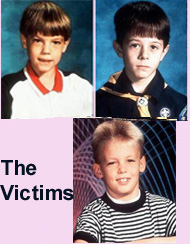 |
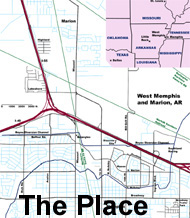 |
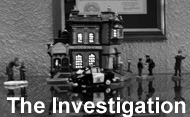 |
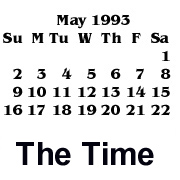 |
 |
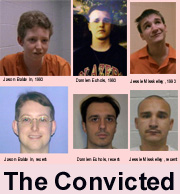 |
| The Place The residents of Memphis, Tennessee have a certain swagger. The poet Gertrude Stein said they acted like "there was no other anywhere." Home to Elvis and the bluesy Beale Street, Memphis has had a tumultuous recent history with triumphs and setbacks. On the one hand, after the downturn in its manufacturing and cotton-based economy it bounced back as the hub of great companies such as FedEx. In St. Jude's Children's Hospital they have an internationally recognized health care center. On the other hand, in recent years Memphis has gained notoriety for having the nation's highest murder rate. West Memphis, a town of 30,000, is across the Mississippi in Arkansas. Its residents have the defensiveness and inverse pride of being big Memphis' little brother. Many chafe at being considered just a shadow of their neighbor, just a truckstop on the interstate. (more below the map) |
|
Notes: a,b, and c represent the homes of Moore, Byers, and Branch, respectively.
Lakeshore is the neighborhood where Jason Baldwin lived, Broadway Trailer Park is where Damien Echols lived, and Highland Trailer Park is where Jessie Misskelley lived. Some people familiar with the West Memphis murders and witch trials incorrectly attribute what went wrong was because the city of West Memphis was some sort of hillbilly town, and consider Arkansas as being synonymous with backwardness. George Bush, Sr. reflected this attitude of dismissing Arkansas when, in his 1992 campaign, he described Clinton as a "failed governor from a small state." Although Arkansas does suffer from many of the same problems that afflict the south including good old boy politics, higher than national average rates of poverty and high school dropouts, the state is also an overachieving producer of business and national political leaders including Bill Clinton, Mike Huckabee, William Fulbright and Sam Walton. West Memphis is far from being an unsophisticated and isolated hick town. During the week of the murders, West Memphis hosted a series of Russian silent films. West Memphis is the largest town in Crittenden County. The county stretches from suburb and rich loam into small town and hard scrabble farm-land. Its population is an even mix of whites and blacks and includes urban escapees, multigenerational residents, and those who resettle from the more rural surroundings. Although the town's residents overlapped with their rural cousins, city life in West Memphis differed from that of the smaller towns of Arkansas, and sometimes in troubling ways. As one West Memphis police officer put it, "In other parts of Arkansas, people shoot their guns into the air for fun. In West Memphis, they shoot at each other." West Memphis has more than its share of crime. It is poorer than most of the suburbs of Memphis. As in many other towns on state borders, criminals who know how to work the system cross state lines to commit crimes and escape between the cracks of multiple jurisdictions. Two cross-country interstates intersect on the north center of town making it a hub for drug trafficking and other smuggling. As with many Southern cities, churches dominate the life of the community, their buildings appearing seemingly on every other block. Churchgoers often attend services during the week along with Sunday. Beyond that there are innumerable special events and revivals. The term "Bible Belt" was coined by HL Mencken to describe a mindset of Biblical literalism that permeated much of the South. He declared Memphis "The Buckle in the Bible Belt." Still, perhaps it is a literalist mindset to see Southerners in such simplistic terms. In reality, the South has a dual personality of praising the Lord and giving the devil his due. The terms hellraiser, redneck, and rebel inspire a pride in many. Going to church salves the soul, but raising a little hell is also good for the spirit. This duality is reflected in the local sports teams. In the city of West Memphis, the high school team goes by the name of the Blue Devils. |
![]()
|
|
![]()
|
Copyright © 2008 Martin David Hill
|